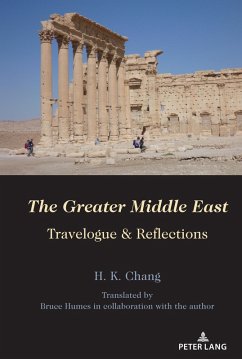Greater Middle East: Travelogue and Reflections is a history reader, cultural primer and notebook of a peripatetic rolled into a single volume. Raised in Taiwan and steeped in Chinese culture, Professor Chang set out on his self-styled "voyage across civilizations" from Gondar, Ethiopia, where his parents pioneered a medical center for WHO in the early 1960s.
Over the next five decades, he voyaged frequently. Two hard statistics are informative: 105 countries, 58 years. Based on his on-the-ground observations, he proposes the concept of a "Greater Middle East" that consists of 16 countries of the traditional Middle East, plus another 15 located on its periphery. Excepting Israel, the former are overwhelmingly Muslim, with Egypt to the west, Yemen and Oman to the south, Turkey to the north, and Iran to the east.
But his travelogue also takes us to the "fringes": North Africa's Maghreb, whose fusion of pre-Islamic Berber roots and deep Muslim faithmakes it unique; the four countries of the Horn of Africa where Asia meets Africa, particularly Ethiopia with its Orthodox Christian faith and Jewish Falasha; the Mediterranean's Greece, Cyprus and Malta; and the hodge-podge of ethnicities and religions that inhabit the southern Caucasus-Armenia, Georgia and Azerbaijan.
Professor Chang is not an Arabist, an anthropologist or a travel writer along the lines of a sometimes-caustic Paul Theroux. Nor is he a European limited by a traditional Western education with its emphasis on Judeo-Christian values. While this travelogue is hardly a Chinese "take" on the Greater Middle East, it does benefit from the author's firm grounding in East Asian culture and history. In particular, there are several "bonus" chapters documenting the impact of the Mongol Empire and nomadic culture of the Turkic peoples on the region, and this is something special-perhaps even unexpected-that you won't find in your run-of-the-mill Middle East guidebook.
Over the next five decades, he voyaged frequently. Two hard statistics are informative: 105 countries, 58 years. Based on his on-the-ground observations, he proposes the concept of a "Greater Middle East" that consists of 16 countries of the traditional Middle East, plus another 15 located on its periphery. Excepting Israel, the former are overwhelmingly Muslim, with Egypt to the west, Yemen and Oman to the south, Turkey to the north, and Iran to the east.
But his travelogue also takes us to the "fringes": North Africa's Maghreb, whose fusion of pre-Islamic Berber roots and deep Muslim faithmakes it unique; the four countries of the Horn of Africa where Asia meets Africa, particularly Ethiopia with its Orthodox Christian faith and Jewish Falasha; the Mediterranean's Greece, Cyprus and Malta; and the hodge-podge of ethnicities and religions that inhabit the southern Caucasus-Armenia, Georgia and Azerbaijan.
Professor Chang is not an Arabist, an anthropologist or a travel writer along the lines of a sometimes-caustic Paul Theroux. Nor is he a European limited by a traditional Western education with its emphasis on Judeo-Christian values. While this travelogue is hardly a Chinese "take" on the Greater Middle East, it does benefit from the author's firm grounding in East Asian culture and history. In particular, there are several "bonus" chapters documenting the impact of the Mongol Empire and nomadic culture of the Turkic peoples on the region, and this is something special-perhaps even unexpected-that you won't find in your run-of-the-mill Middle East guidebook.

